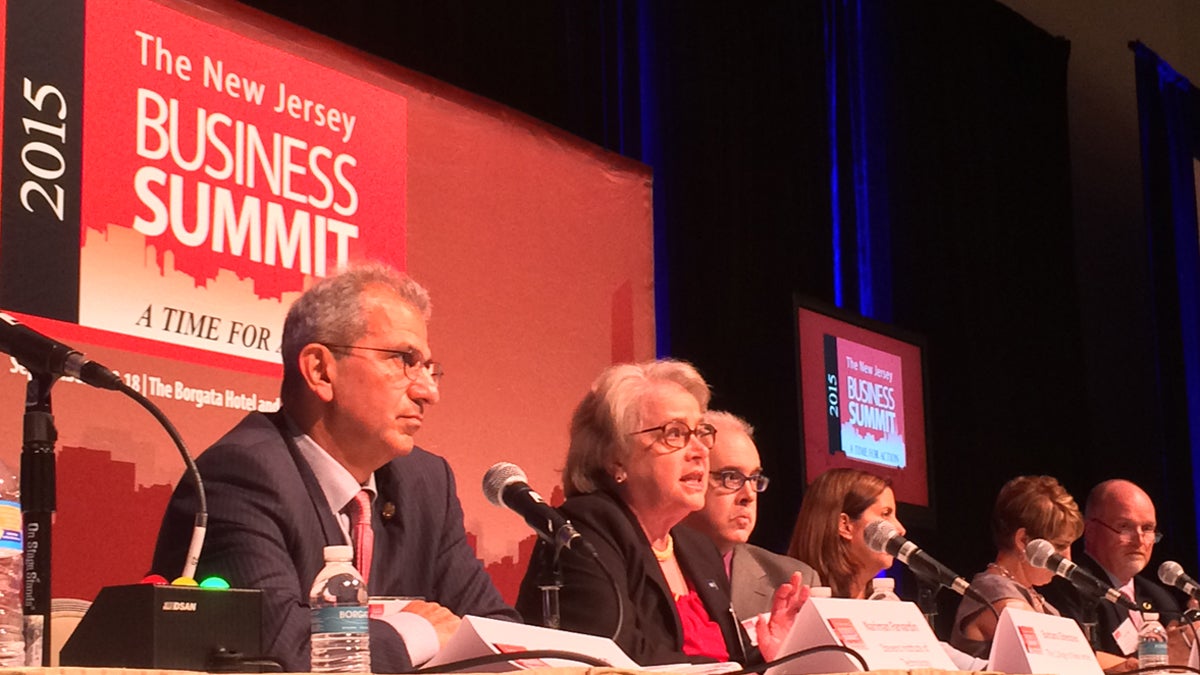NJ business conference emphasizes better coordination with government

Panelists including TCNJ president Barbara Gitenstein (second from left) discuss workforce readiness in New Jersey. (Joe Hernandez/WHYY)
The first-ever New Jersey Business Summit, organized by more than 40 chambers of commerce statewide and hosting a sold-out crowd of more than 500, wrapped its two-day run in Atlantic City Friday.
Entitled “A Time For Action,” the summit frequently focused on improving how state and local government communicates with the business community.
“We are a state blessed with enormous resources, and we have enormous potential, but we are in a so-so rut. We’re stuck in neutral,” said New Jersey Chamber of Commerce President Tom Bracken in his opening remarks.
“We need to raise the bar dramatically both on short-term and long-term expectations, and we shouldn’t settle for anything less than achieving those new, high, realistic goals.”
The summit kicked off with a presentation by Celgene, a Summit-based pharmaceutical company, and then moved into panel discussion on issues including workforce readiness, taxes, regulations, as well as transportation and infrastructure projects.
In addition to business-sector leaders, small-business owners like Rick Weber, who runs the South Jersey Marina in Cape May, peppered the conference room in the Borgata Hotel Casino & Spa.
Although Weber insisted that government regulators are often well intentioned, he said navigating state regulations and mandates can be frustrating.
“We were joking about the differences between a Twix candy bar — which is actually not a candy bar; that’s a chocolate-covered food and therefore nontaxable — as opposed to a Milky Way which is a candy bar and therefore taxable.”
Weber and other panelists stressed the need for state and local government to speak with business owners before passing laws and regulations affecting them.
But the conference also turned toward other sectors that influence the health of New Jersey’s economy, such as higher education.
Barbara Gitenstein, president of The College of New Jersey, lamented that New Jersey is notorious for having more talented workers leave the state than enter it.
She said preparing students for the workforce should not hinge on taking specific classes or mastering certain subjects but instead learning skills that can be used across a variety of jobs.
“Oral skills, written skills, communication skills, ability to work in teams,” she said. “So that we can understand exactly how that works not just for that first job, but for the job 15 years out. And that is what the business community wants.”
Gitenstein added that colleges should also recognize that businesses may need talented workers sooner rather than later.
Also in attendance at the summit were leaders from the state Legislature, including Senate President Steve Sweeney, D-Gloucester.
WHYY is your source for fact-based, in-depth journalism and information. As a nonprofit organization, we rely on financial support from readers like you. Please give today.




